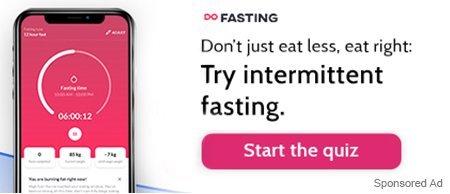What is Cholesterol | Cholesterol and Cardiovascular Diseases | Can Intermittent Fasting Lower Cholesterol | Fasting And Cholesterol Side Effects
Intermittent fasting, or fasting in general, has been linked with many positive changes in the body. One of the major benefits of intermittent fasting is improved heart health and reduced cholesterol levels.
Cardiovascular diseases are one of the leading causes of death worldwide, and high cholesterol levels are often the reason for most of these complications. People who want to adopt intermittent fasting for cholesterol regulation should read this article to learn how fasting impacts it.
Does Fasting Lower Cholesterol?
In short, over time yes intermittent fasting can help you lower cholesterol. But it is important to be eating the right foods, exercising regularly, and practicing healthy life habits. We will cover more science and data to show you how and why.
Let us Understand Cholesterol First
Before we find a relation between intermittent fasting and cholesterol levels, let us try and understand what cholesterol is and how it affects the body. Cholesterol is a lipophilic molecule that transports inside lipoproteins in the body through blood.
Lipoproteins are essential for human life and carry out various tasks in the body. Five of these lipoproteins are:
- HDL Cholesterol or High-density lipoprotein
- LDL or Low-Density Lipoprotein
- VLDL or Very Low-Density Lipoprotein
- IDL or Intermediate-Density Lipoprotein
- Chylomicrons
Each of these lipoproteins circulates cholesterol and triglycerides in the body.
Cholesterol plays a crucial role in the body for various functions. It contributes to the normal function of the cell; it is one of the major components of the cell membrane and also helps maintain fluidity in the membrane.
Cholesterol is also needed to synthesize vitamin D, sex hormones, and steroid hormones. It plays a significant role in digestion as it is a part of the bile salt used for digestion. Cholesterol is produced in the liver, but we also get it from many food sources.

Cholesterol and Cardiovascular Diseases
While cholesterol plays a role in the body’s metabolic functions, high cholesterol levels in the blood can be harmful and associated with cardiovascular disorders. HDL and LDL are the two lipoproteins mainly responsible for transporting cholesterol in the body.
In simple terms, HDL is called the ‘good cholesterol,’ whereas LDL is known as the ‘bad cholesterol.’
These are called such because HDL takes the unused cholesterol to the liver for further processing, whereas LDL does not.
The extra cholesterol with LDL will stick to the walls of the blood vessels. It has a waxy texture, and when it keeps getting stuck to the blood vessels, it constricts them, blocking proper blood flow.
It leads to fat deposits in these blood vessels causing blockage and many related cardiovascular diseases. The most common one is atherosclerotic cardiovascular disease.
In some cases, this cholesterol can also collect in the blood vessels making clots that cause a stroke. High LDL levels are dangerous for the body, and researches show a direct connection between high cholesterol and heart diseases.
In addition to cholesterol, there is a chance of rising triglycerides, which are lipids that can get deposited in the blood vessels. Triglycerides are formed from the unused energy in the body, and unlike cholesterol which is a lipoprotein, these are fats.
Combined with high cholesterol, these can increase the risk of heart attack and strokes. Since the body cannot mix cholesterol with the blood, lipoproteins are often packaged with proteins and triglycerides.
So, when we talk about LDL and HDL, these include triglycerides as well.
Does Intermittent Fasting Lower Cholesterol?
In short, serum cholesterol levels are increased while fasting, and also there is increased lipolysis, a process of lipid breakdown. The rise in cholesterol levels is because the liver stops taking in the cholesterol, and it gets used to burn fat as energy instead of storing it as fat.
A change in eating pattern and diet and regular exercise are the remedial measures to lower cholesterol in the body.
A lot of research suggests that intermittent fasting and cholesterol levels are directly as well as indirectly related. While intermittent fasting or fasting for an extended period, the body runs out of glucose sources and starts burning fats.
In a study done by the American College of Cardiology, the subjects were asked to water fast for 24 hours. The results after 24 hours showed that intermittent fasting raises cholesterol levels in the blood.
Even though there was no intake of lipids, the body started ketosis, and the levels of growth hormone also increased, leading to lipolysis. Lipolysis is the process of lipid breakdown. The rise in the cholesterol levels in the blood was because the liver stopped taking in the cholesterol, and it was readily being used as energy.
Fasting for a longer duration is linked to increased serum cholesterol in the blood and a faster reduction in weight. That is again due to substantial lipolysis after fasting.
It was seen that when the body did not get food for a long duration, it burned the available glucose, the fat in the body became the next target, and lipolysis started. Intermittent fasting triglycerides levels also decrease in people who follow the 5:2 diet pattern. A study shows—that fasting benefits by improving the lipid profile in the body leading to a reduction in weight.
In addition to this, insulin levels also stay on the lower side when fasting. It means that the storage of fat is reduced considerably, and hence it is readily used by the body to produce energy. Losing weight can reduce LDL cholesterol, blood sugar, and triglycerides levels. Fasting aids in weight loss and, in turn, the maintenance of lipid profile in the body.
Furthermore, people who practice intermittent fasting keep calorie restrictions and start with healthier eating to have a better effect on their bodies and weight loss. It is important to note that intermittent fasting can help reduce weight and improve lipid profile when you avoid food with excessive LDL.
Are you having trouble losing weight with intermittent fasting? Find out possible reasons behind it, read – 8 Reasons You’re Not Losing Weight On Intermittent Fasting.

Fasting And Cholesterol, Are There Any Side Effects?
There are no proven side effects of intermittent fasting on cholesterol levels in the body.
There are also no side effects of fasting on people with high cholesterol. Intermittent fasting cholesterol levels studies indicate that it is one of the best ways to reduce weight which further helps in reducing the risk of cardiovascular disorders.
With this said, there are a few things that need to be kept in mind.
- The first is that any patient suffering from cardiovascular disorders, having high cholesterol, and taking medication should consult with their doctor before including intermittent fasting in their lifestyle.
- People with other co-morbidities or who have had heart surgeries should also first consult their doctors. People who have had a history of eating disorders should also practice fasting with caution.
- Additionally, pregnant and lactating women should avoid intermittent fasting. There are also other ways to reduce cholesterol levels in the body. So, even though fasting is helpful, you should always have a professional opinion before starting.
- It is also essential to understand that even though fasting has shown results in people with high cholesterol levels, the effects can only stay if a healthy diet and exercise regime is followed. Limited LDL intake and losing weight are essential to reduce cholesterol levels. The rule of thumb is to have high HDL levels and low LDL levels to prevent the risk of heart diseases.
Want to know if you can follow fasting during pregnancy, read – Intermittent Fasting While Pregnant.
To Sum Up
So, does intermittent fasting help cholesterol management? Does intermittent fasting lower cholesterol levels? Yes, it does.
In the longer run, research shows a reduction in cholesterol levels and weight in people who fast regularly. Fasting can directly impact cholesterol levels in the body by speeding up the process of lipolysis and indirectly aiding in weight loss. The calorie restriction that comes with intermittent fasting also reduces LDL intake, which can further help balance lipid levels in the body. So, fasting is an effective way to manage cholesterol levels and reduce the risk of heart diseases.
Need help in planning your fasting meals to get the results you are looking for? Want to see if Intermittent Fasting will help you lose or maintain weight? For weight loss or weight maintenance, choose your favorite meal plan based on your preference. Check out Intermittent Fasting Meal Plans.











